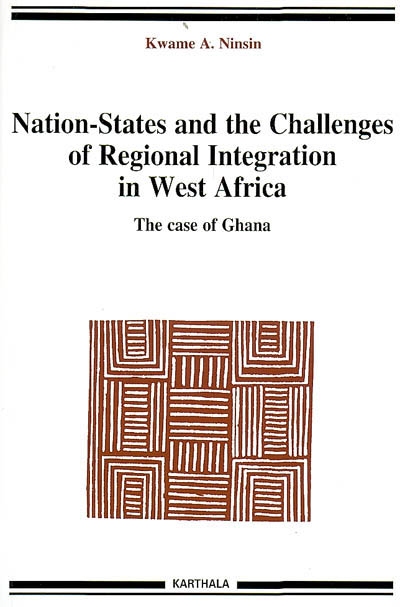en savoir plus

Permet à tous ses détenteurs d'obtenir 5% de réduction sur tous les livres lors du retrait en magasin (réduction non cumulable avec les réductions de type étudiant).
Offre également un certain nombre d'avantages auprès de nos partenaires.
Avec les favoris, retrouvez dans un espace les sélections effectuées au fur et à mesure de vos navigations dans le site.
Constituez pour votre usage personnel vos listes de livres en prévisions d'achats futurs et votre sélection d'articles, dossiers, événements, vidéos ou podcasts préférés ou à découvrir plus tard...
Il suffit simplement de cliquer sur "Ajout Favori" sur chaque page qui vous intéresse pour les retrouver ensuite dans votre espace personnel.
Requiert un compte Mollat
Requiert un compte Mollat
Nation-States and the challenges of regional integration in West Africa. Vol. 7. The case of Ghana
en savoir plus
Résumé
Contributions à un séminaire de 2005 sur l'intégration régionale dans la Communauté économique des Etats de l'Afrique de l'Ouest, la politique régionale du Ghana, le commerce des produits agricoles au Ghana, la dimension linguistique et monétaire des politiques d'intégration nationale et régionale, etc. ©Electre 2026
Quatrième de couverture
Since the Treaty establishing the Economic Community of West African States (ECOWAS) was signed in 1975, several protocols have been adopted providing the legal and institutional framework for implementing the integration of the West African sub-region. All social and political stakeholders agree that regional integration is a major challenge for development in West Africa. Yet the regional integration process has been affected by many delays, even failures. Member states have pursued a seemingly contradictory dual objective : build a Nation-state within colonial borders and achieve regional integration to fight against under-development. Can national planning priorities be reconciled with the demands and objectives of regional integration processes in West Africa ?
Since 2005, under the auspices of the Management of Social Transformations (MOST) Programme initiative, the Social and Human Sciences Sector of UNESCO has organized a series of national seminars on West African regional integration in the ECOWAS region. Four seminars have so far been organized in Senegal, Mali, Benin and Ghana. This anthology publishes papers presented at Ghana's national seminar on « Nation-states and the Challenge of Regional Integration in West Africa : the Case of Ghana », held in Accra from 8 to 9 November 2005.
The contributors suggest that Ghana's reluctance to relinquish its sovereignty stemmed from a lack of commitment in the first 20 years of ECOWAS' existence and preoccupation with its own security and survival against internal and external threats. The state has currently demonstrated renewed commitment by establishing a Ministry of Regional Cooperation and the New Agenda for Africa's Development (NEPAD) to coordinate and manage the sub-regional integration programme.
In spite of positive developments, results have been disappointing. The new ministry remains isolated and is constrained by limited resources in finance and manpower. Its approach to integration issues has been elitist and technocratic, concentrating on formal trade and ignoring the importance of the informal trade that has been the traditional means of popular participation in the integration of West African economies. Borderland communities with economic and social ties continue to engage in exchanges across political boundaries in defiance of national and state security concerns. Empowerment of Ghanaians involved in small-scale, informal cross-border trade (in majority, women) « would not only increase the levels of social and economic integration, but would make the benefits of integration available to large sections of the population ».
Fiche Technique
Paru le : 23/03/2009
Thématique : Essais d'économie
Auteur(s) : Non précisé.
Éditeur(s) :
Karthala
Collection(s) : Hommes et sociétés
Contributeur(s) : Editeur scientifique (ou intellectuel) : Kwame A. Ninsin - Auteur : Kwame A. Ninsin - Auteur :
Série(s) : Nation-States and the challenges of regional integration in West Africa
ISBN : 978-2-8111-0166-4
EAN13 : 9782811101664
Reliure : Broché
Pages : 160
Hauteur: 24.0 cm / Largeur 16.0 cm
Poids: 290 g

